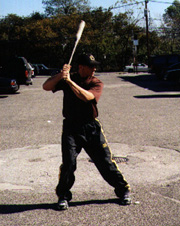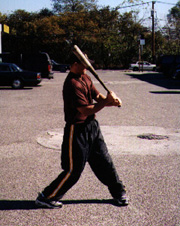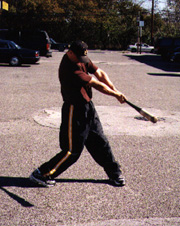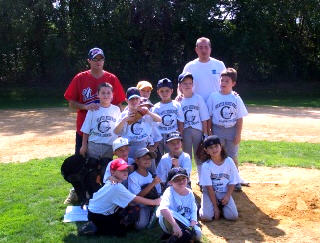News and Announcements
The Number 1 Web Site For Softball Coaches, & Players
Posted by Patrick Piteo at Feb 25, 2003 4:00PM PST
( 0 Comments
)
Monthly Feature - "A Common Hitting Flaw and How To Correct It!" We all want our hitters to have a quick, short and compact "A2C Swing" that gets the bat to the ball as quick as possible. What is the single most common mistake that causes a girl's swing to "GO BAD"? I think "Pulling The Front Side Out Too Early" is the most common flaw I see this time of year. This flaw causes fly-balls, pop-ups, frequent foul balls and a drastic lack of bat speed. The batter prematurely pulls the front shoulder out. This causes a "domino effect" of other flaws. The front shoulder will tilt upward, the hands then drop, and the barrel drags to create a "Undesirable Long Swing". Coaches need to quickly spot this flaw and "coach" the hitter to correct it immediately. Coaches should emphasize.... 1) The hitter's front side and hands must first move in the direction of the ball. 2) Your shoulder moves or rotates during the swing, not before, not after. 3) Make sure you maintain proper balance before, during and after the swing. 4) You must rotate at the proper time to generate power and to execute the proper swing for each pitch location. Every pitch location requires some degree of shoulder rotation. But young and older hitters must learn that pitches on the inside 2/3rds of the plate require a greater degree of rotation. The inside strike requires maximum shoulder rotation in order to "Pull" this pitch. Hitting a strike on the outside 3rd of the plate involves much less or minimum shoulder and hip rotation. Spot and eliminate this flaw as early as possible. "Pulling Off" the ball is what we call this common flaw. I think that the first step toward curing it is teaching every hitter on your team including the "power" hitter and the "contact" hitters to "GO WITH THE PITCH". Hit the ball where it is! Do not try to "WOMAN HANDLE" everything. You can't "Pull What You Have To Punch" and You Can't "Punch What You Have To Pull". VISUALization" - Use it to build TEAM ESTEEM and SELF ESTEEM! "Visualization" is the process of seeing things in your mind. It is an important part of building confidence and poise. I always tell my pitchers to "visualize" the perfect pitch and then "throw it". I tell my hitters when you are on deck, "visualize" hitting a double, in the gap, off the wall and then do it. Sometimes I have my players sit alone and they are to visualize every possible play they can possibly make during a game. They are to "see themselves doing everything perfect"! I want them to see us scoring, playing solid defense, and even celebrating the win! I sometimes do "VISUALization" as a group activity going from player to player with each player giving a "play-by-play calling" as our players make outstanding play after play on offense and defense. How can you do something, if you can't imagine it? See my point? I do not spend to much time doing this, but it makes a great change of pace or "rainy day" activity.
TELL-ME-SOMETHING-GOOD Bring Your Team Closer!
Posted by Patrick Piteo at Feb 25, 2003 4:00PM PST
( 0 Comments
)
Often talented teams with high expectations underachieve and do not perform up to their ability. What causes this? More often than not, what is missing is "GOOD TEAM CHEMISTRY". What can we do as coaches to help build better "TEAM CHEMISTRY"? I want to share with you, one activity that I have used with great results. I use it when I sense "disunity or a lack of team chemistry" developing. You can use a "TELL-ME-SOMETHING-GOOD" player COMMENT SHEET to build "GOOD TEAM CHEMISTRY". Here's how you do it. Give each player a slip of paper with each teammate's name on it. Beside each name are two blank lines. Each player is to write at least two positive things about each of her teammates. These statements must be something that she has always wanted to compliment her on or something that she wants her to always remember that she said! One statement must be "ABOUT THE TEAMMATE'S FASTPITCH SKILLS, ATTITUDE OR HOW SHE PLAYS THE GAME"! The other statement is about the person and her attributes outside softball. This statement says something good about her as a person, not as a player. What is written must be positive! Each player will be given a sheet with everyone's else's comments about them on it. Every player will read what each her teammates said about her! Each comment is labeled with the person's name that said it! The hardest part about this is that you have to take every girl's comment slips, tape all of the comments together, to make each girls sheet. It may take some time but I can tell you that the effort is well worth the results. This is a great way to bring everyone closer. Sometimes it helps a player as much to see what her teammates "did not" write about her as much as to see what they "did" write! I hope I have done an adequate job of explaining how I do this. This is to be a "POSITIVE BUILDING ACTVILITY"! Do not allow girls to say anything negative. Each player MUST FIND TWO POSITIVE THINGS to SAY ABOUT EACH OF HER TEAMMATES! The comment sheets that you compile and give to each player will become one of their "KEEPSAKES FOR LIFE". I have players that cherish these sheets as some of their greatest memories of high school. This activity seems to really "BRING A TEAM TOGETHER" with a new sense of oneness, pride, closeness, and confidence. If you think it might help your team, try it! I think you will like what happens! One last suggestion is to do this as a group activity together without discussion. If you make it an overnight "take home" homework project make sure that the girls do not discuss their answers or comments with others. The comments must be sincere, original and "spoken from the heart"!



"BUILDING TEAM UNITY" - Getting Things Off To A Great Start!
Posted by Patrick Piteo at Feb 18, 2003 4:00PM PST
( 0 Comments
)


Practice Tip - Do Practice "WRITE" !
Posted by Patrick Piteo at Feb 18, 2003 4:00PM PST
( 0 Comments
)

